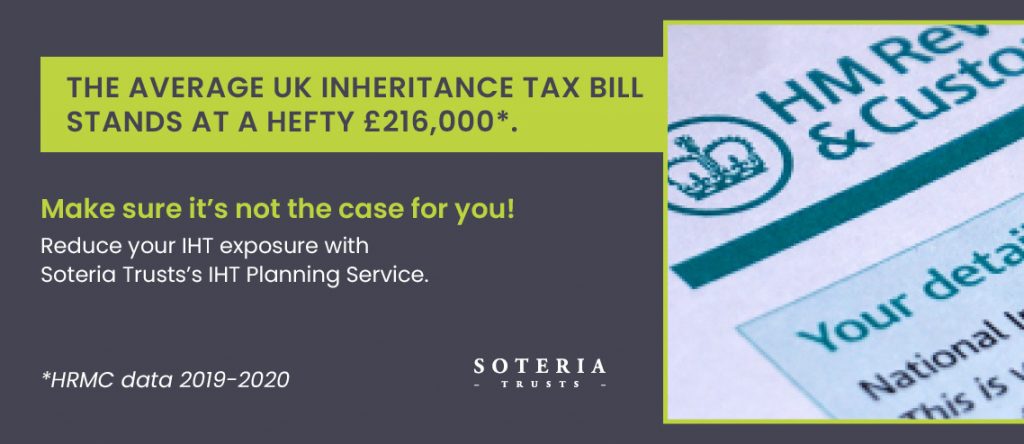HMRC wins IHT case over location of domicile of choice

Please be advised that the information in this article regarding QNUPS and IHT is no longer accurate due to the recent changes announced in the UK Budget. Starting in April 2025, the regulations will have significant implications that may affect your understanding of these topics. We encourage you to stay informed and consult with a Soteria Trusts expert to navigate these changes effectively.
Are you aware of the latest ruling from HM Revenue & Customs regarding Inheritance Tax (IHT) and domicile? In the recent decision, HMRC brought a court claim against an individual they believed had wrongfully listed their father’s domicile as being outside of the United Kingdom to avoid paying IHT. All those paying or expecting to pay IHT must understand and appreciate the potential ramifications this case may have on them. Read on for more details about this interesting case and what its implications could have been for many in similar circumstances.
Related: What is a residence, and what is a domicile?
What is domicile, and what is the domicile of choice?
Domicile is a legal term that refers to an individual’s permanent residence. It is the place where they have the strongest ties, and where they intend to return to after any period of absence.
On the other hand, a domicile of choice is a domicile that an individual chooses for themselves, rather than one they inherit from their parents or by birth. It is a legal concept particularly relevant for individuals who have moved countries or have multiple residences.
By declaring a domicile of choice, individuals can establish their location for legal and tax purposes, and it can have important implications for inheritance and other legal matters.
Taxes for Non-UK domiciled residents
- Non-UK assets are not subject to UK inheritance tax.
- There is no UK income and gains tax on non-UK income and gains unless and until those funds are “remitted” to the UK – brought to the UK directly or indirectly.
- Special capital gains tax rules apply to UK real estate.

Background on the case – what was the dispute between HMRC and the deceased’s estate?
Mr. Anantrai Maneklal Shah (AMS) was born in 1929 in Karachi, which was part of British India at the time. For some years, he and his family lived in what today is Tanzania. In 1954, AMS moved to the UK to pursue his studies in pharmacy. AMS acquired British citizenship when Tanzania gained independence from the UK in 1961.
In 1973, AMS relocated to the UK with his family. He worked as a pharmacist in the UK, buying a pharmacy business in 1975 and gaining ownership of the shop in 1981. After selling the business in 1994, he worked as a locum pharmacist until at least 1997. The freehold of the shop was sold sometime after the business transaction.
After tragically losing his daughter and his wife a year later, and undergoing medical treatments in the UK, he sold his house, which he purchased in 1974, in December 2010. Subsequently, he briefly stayed with his son before settling in a rented flat in London to be closer to his son and his family. In 2012, AMS moved into a London flat that his son acquired as an investment. During the same year, he invested in a non-UK company specializing in UK commercial property.
In 2014, he made two wills—one under UK law for his UK assets and another under Indian law for non-UK assets. On 8 July 2014, he was registered as an Overseas Citizen of India. AMS passed away on 7 June 2016.
Upon investigation, HMRC confirmed that AMS did not have a domicile of origin in the UK. However, HMRC argued that AMS had acquired a UK domicile of choice after 1973, while his executors insisted that his domicile was in India.
Read the full case details here.
Key legal principles involved in determining the domicile of choice
Determining one’s domicile of choice is a complex process that involves important legal principles. To determine someone’s domicile of choice, several factors must be considered, such as:
- their current and past physical location;
- their intentions;
- and their social and economic ties.
These principles help courts establish where a person has the strongest connection and a genuine intention to reside. In turn, this will significantly impact their legal status and rights, making determining one’s domicile of choice critical.
Related reading: Domicile and IHT Planning
The outcome of the case and implications for other similar IHT cases going forward
In the case at hand, HMRC argued that the actions of AMS were not in line with the suggestion that he intended to move permanently to India. Despite residing in the UK for 43 years, AMS had only visited India twice during that time. Given his age, state of health, and strong family connections in the UK, it is unrealistic to assume that AMS planned to relocate far away from his loved ones and settle in an unfamiliar part of India.
Interestingly, AMS’s executor claimed that he still had intentions of returning to India once his health permitted and had even made arrangements for accommodation there. Such assertions indicate that AMS’s domicile was still up for debate. If it could be proven that AMS was domiciled in India, they might have been eligible to benefit from the UK-India capital tax treaty. This treaty has the potential to override the UK-deemed domicile rules, offering exemptions for certain non-UK assets from UK IHT.
This case emphasizes the importance of maintaining credible evidence when arguing non-UK domicile status. It is crucial for individuals to gather and preserve supporting documentation to strengthen their claims.

Tips for individuals considering leaving the UK as part of their estate planning
If you are considering leaving the UK as part of your estate plan, there are certain things you should keep in mind to ensure a smooth transition for you and your loved ones. First and foremost, it’s important to understand the tax implications of leaving the UK and how they may affect your finances.
As we saw in the example above, domicile plays a crucial role in establishing taxation on worldwide assets. Leaving the country and purchasing assets outside the UK won’t be enough to shelter your wealth from IHT exposure.
Advice on how to best prepare for your IHT bill
Planning is essential to ensure your loved ones are not faced with an overwhelming inheritance tax (IHT) bill. Begin by identifying your assets in scope and think about who you wish to inherit them. Make sure you have a Will in place. Review your will regularly and update it as necessary to reflect any changes in your circumstances. You may also want to consider other solutions to help mitigate your IHT liability: Trusts, QNUPS (Pensions), and Business Relief Accounts.
TRUST AND CONTRACT-BASED RETIREMENT PLANS – QNUPSPensions that meet the criteria of being a registered pension, as defined by ‘HMRC’ are exempt from IHT following a member’s death. The Trust ensures that the pension assets (your contributions) are kept separate from those of other members and are exempt from CGT once held within the pension. Assets allowed in QNUPS:Investment property, stocks, collections, cars, and much, much more… |
Related reading: What is a QNUPS?
It is also wise to consult with an advisor specialising in estate planning for expatriates to help you navigate the complexities of international tax laws and ensure your assets are protected. Proper estate planning can provide peace of mind and ensure that your wishes are carried out, no matter where in the world you call home. Contact us today for a complimentary consultation.